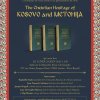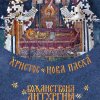The Serbian Diocese for Western Europe invites you to a presentation of the book The Christian Heritage of Kosovo and Metohija on Monday, June 29, 2015, at 19h at l'Auditorium Jean XXIII de la Mutuelle Saint-Christophe 277 rue Saint-Jacques Paris 75005 (métro: Port-Royal).
Speakers and presenters
- Bishop Maxim of the Western American Diocese
- Raphaëlle Ziadé, spécialiste de l’art byzantin, Réunion des Musées nationaux
- Jean-François Colosimo, directeur des éditions du Cerf
- Jacques Hogard, colonel, ancien commandant des forces spéciales françaises au Kosovo
- Jean-Christophe Buisson, chef de rédaction culture au Figaro Magazine
In cooperation with: Mutuelle d’Assurance Saint Christophe et Orthodoxie.com
Informations: This email address is being protected from spambots. You need JavaScript enabled to view it. ; tel : 06.67.71.76.74






